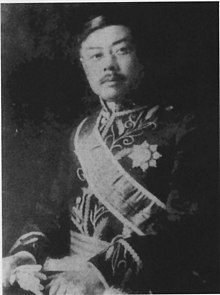Yan Huiqing
| Yan Huiqing | |
|---|---|
 |
|
| President of the Republic of China | |
|
In office 13 May 1926 – 22 June 1926 |
|
| Preceded by | Hu Weide |
| Succeeded by | Du Xigui |
| Premier of the Republic of China | |
|
In office 18 December 1921 – 24 December 1921 |
|
| Preceded by | Jin Yunpeng |
| Succeeded by | Zhang Xun |
|
In office 25 January 1922 – 8 April 1922 |
|
| Preceded by | Zhang Xun |
| Succeeded by | Zhou Ziqi |
|
In office 11 June 1922 – 5 August 1922 |
|
| Preceded by | Zhou Ziqi |
| Succeeded by | Wang Chonghui |
|
In office 14 September 1924 – 31 October 1924 |
|
| Preceded by | Wellington Koo |
| Succeeded by | Huang Fu |
|
In office 13 May 1926 – 22 June 1926 |
|
| Preceded by | Hu Weide |
| Succeeded by | Du Xigui |
| Personal details | |
| Born | 2 April 1877 |
| Died | 24 May 1950 (aged 73) |
| Political party | Anhui clique |
Yan Huiqing (Wade–Giles: Yen Hui-Ch'ing, (Name in English: Yen, Wei Ching Williams or W.W. Yen) 顏惠慶 (2 April 1877 – 24 May 1950) was a Chinese writer, politician, and diplomat from Shanghai.
A graduate of the University of Virginia, he taught the English language at St. John's University, Shanghai in a short time after coming back from the United States and then went to Beijing to start his political career. It was in the US he became a Freemason.
He served as premier five times and simultaneously as acting president on his last premiership in 1926. Wu Peifu handpicked him for the acting presidency to pave the way for Cao Kun's restoration but he was unable to take office due to Zhang Zuolin's objection. When Yan finally took his post, he immediately resigned and appointed navy minister Du Xigui as his successor.
He was also China's first ambassador to the Soviet Union and he was a delegate in the League of Nations. During World War II, he translated and compiled Stories of Old China in Hong Kong while under Japanese house-arrest in 1942. He took his first plane trip in 1949 to Moscow in hopes of resolving the Chinese Civil War.
...
Wikipedia
